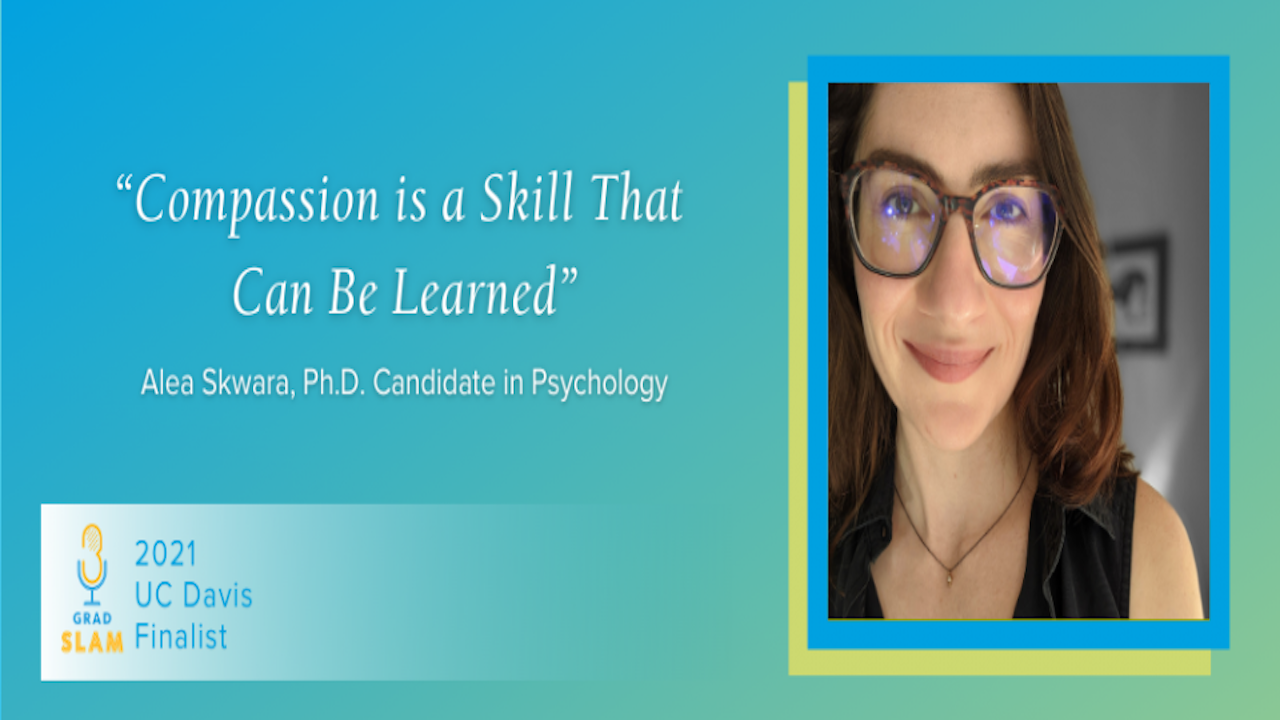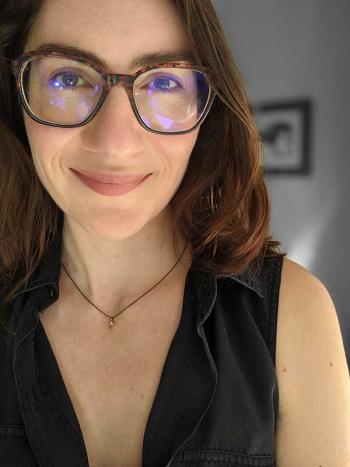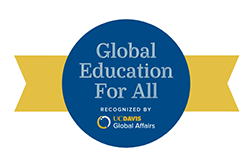
Grad Slam Finalist Profile: Psychology Graduate Student Alea Skwara
Meet Alea Skwara, Psychology Graduate Student and Grad Slam Finalist

"Name
Alea Skwara (she/her)
Program, Degree and Year of Study
Psychology, Ph.D., 7th year
Research Interest
Compassion and responses to suffering, engaged compassion, and contemplative neuroscience
Previous Degrees and Colleges
B.A. in Theater, Davidson College
M.A. in Psychology, UC Davis
Title of Grad Slam Presentation
Compassion is a Skill That Can Be Learned
Describe your presentation style in three words.
Engaging, Present, Warm
What did you do to prepare for Grad Slam?
I first watched previous winners' talks to get a sense of what level of detail and depth was appropriate, and what three minutes "felt" like.Then I spent some time thinking about what was the main point I wanted people to understand about my research. Once I distilled the message down to this "essential drop," I reflected on if and how I could provide an embodied and engaged experience. How I could get my audience to participate and understand, rather than passively listening?
Once I had an idea for how I could do that, I looked up an average of how many words per minute someone can fit into a speech, and wrote my script. It was way too long at first, of course. I started with the "everything I want to say" draft, and then cut and cut and cut—considering what purpose each sentence served and whether it was necessary to communicate the core point, always returning to that "essential drop."
When I had a version that I thought, based on word count, could fit into three minutes, I used a teleprompter app to practice my timing and flow until I could reliably get through the talk in three minutes without feeling that I was rushing. Then I recorded myself and watched it back, noting things that I wanted to improve. I did this a few times until I had a recording I was happy with. I was a theater major in undergrad, so this was a fun way to re-engage those skill sets!
What initially attracted you to your field of study?
After finishing undergrad, I was feeling overwhelmed by the vast range of inequities and injustices in the world, and the many different types of suffering that people endure. I asked myself, “If there was one thing that could influence all of these different areas of need, what might it be?” The answer that came to me was "compassion." If we could help people expand their care and concern for the well-being of others, many of our shared challenges and ills would be so much easier to face and overcome.
Grad Slam is about presenting complex ideas for a general audience. Why would people want to learn more about your research?
People often think of compassion as something that you either have or you don't—or that you are inspired to feel in a certain situation or you are not. More rarely do people think of it as a capacity that can be cultivated and enhanced. But the research in my area shows us quite clearly that it can be. And I think that's really empowering, to know that you can have the ability to help yourself grow in that way.
What do you like to do in your free time?
I spend most weekends skiing, rock climbing, mushroom foraging, hiking and backpacking as each season allows. At home, I love to read, meditate, cook, garden, tame stray kittens, play guitar and sing.
Do you have any mentors who helped you develop your interest and strength in research communication? If so, how did they help you?
I've had many mentors who have nurtured this in different ways. As an undergraduate in theater, my training was focused on how to communicate a story with an audience, which helps inform my science communication to this day.
Before I started grad school, I worked as a lab manager in a lab that studied adolescent development. The PI of that lab was very focused on science communication and encouraged me to do presentations for local community organizations. During my Ph.D. training, my advisor has always encouraged me to explore and connect with different research and contemplative communities around the world, and has been incredibly generous about sending me to conferences and training institutes. He has also encouraged and supported me to form interdisciplinary collaborations. The experience communicating and connecting with people who come from different backgrounds from my own and work in different areas has helped me learn how to communicate my work clearly and effectively.
Where do you see yourself in 10 years?
I see myself working to bridge research and application. There is so much we know, scientifically, about the factors that encourage and support compassionate responses to suffering, and so much excellent work that is being done to further the greater good across a huge range of applied areas. But often the translational link between these worlds is tenuous. There is so much to be gained from a bi-directional conversation where each body of knowledge and experience informs the work and priorities of the other. I see myself engaging in intentional work to bridge these worlds, whether that is at an academic research center, a non-profit or NGO, or in government.

Global Education for All Recipient
Alea's presentation has received the Global Affairs' Global Education for All designation. This means the majority of selection committee members have agreed that the recipient's project: (1) helps accomplish at least one of Global Affairs' global learning goals, and/or (2) clearly addresses at least one UN Sustainable Development Goal while grappling with the complexity of doing so. The "Global Education for All" prize recognizes a Grad Slam submission that illustrates how a graduate student embraces global learning. Global learning at UC Davis is a combination of local, regional, national, and international experiences through which the student develops key skills, knowledge, and networks that help them build global awareness, engage global diversity and pursue collaborative and equitable global action. The finalists will have the opportunity to have their video showcased at the Global Learning Conference hosted by the Global Learning Hub in Global Affairs in April of this year. Learn more about this designation."
Read the full story at the UC Davis Graduate Studies website.